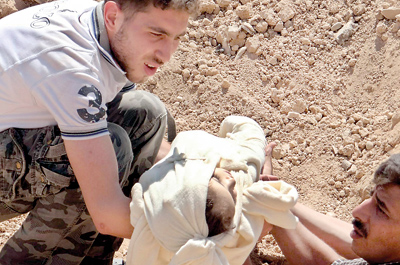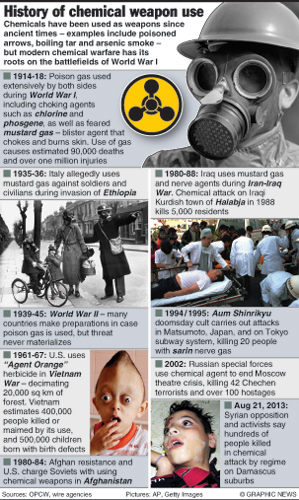Sunday Times 2
‘I was asleep, then my breath seized up’
A 13-year-old boy has told how ‘his breath seized up’ as poisonous fumes descended on his Damascus home in the gas attack allegedly launched by Syrian regime forces. The boy has given one of the first witness accounts by survivors of Wednesday morning’s alleged attack which, it is claimed, killed up to 1,700 people in their beds.

An image released by the Syrian opposition's Shaam News Network shows Syrians carrying the body of a child into a mass grave following what Syrian rebels claim to be a toxic gas attack by pro-government forces in eastern Ghouta, on the outskirts of Damascus on August 21 (AFP PHOTO/HO/SHAAM NEWS NETWORK/AMMAR AL-ARBINI)
His shocking testimony comes as the United Nations Children’s Fund (UNICEF) revealed that the number of Syrian children forced to leave their homeland as refugees has now reached one million. And today the regime of President Bashar al-Assad came under renewed pressure as even his close ally Russia urged him to allow U.N. inspectors access to the site of the alleged atrocity.
The Syrian government denies launching the attack, of which the first eyewitness accounts emerged this morning.
A boy, whose name was given only as Abdullah, told how he was sleeping in his bed when the attack began before dawn on Wednesday. ’I was asleep,’ he told the Daily Telegraph. ‘Then my breath seized up. I tried the stairs but I couldn’t find the steps: I had lost control of my body.’
His father and brother were killed, he said. His mother is still alive. A second witness, named as Mohammed Ibrahim, 24, told the paper how he had heard the initial explosion and ran outside to help. He said: ‘I saw women and children lying in the streets dying or collapsed or already dead, even babies. I became contaminated myself and fainted and don’t remember anything after that.’
As the evidence piles up, the Russian Foreign Ministry today signalled a dramatic turnaround by announcing it has urged Syria to allow a U.N. experts mission already in Damascus access to the site of the alleged atrocity. The ministry also said in a statement that Foreign Minister Sergei Lavrov and U.S. Secretary of State John Kerry had yesterday agreed that an objective investigation was needed into the allegations.
Russia has been Assad’s most powerful international ally during Syria’s civil war. The ministry statement said rebel forces should guarantee safe passage for the UN mission. UN inspectors in the country – and foreign journalists – have previously come under attack from elements within Syria’s opposition movement.
Meanwhile, Syrian activists say they are smuggling out body tissue samples from victims of the alleged chemical weapons attack and are trying to get them to the inspectors, who are staying in a hotel just a few miles away. Activist Abu Nidal, speaking from the town of Arbin, told Reuters: ‘The UN team spoke with us and since then we prepared samples of hair, skin and blood and smuggled them back into Damascus with trusted couriers.’
The opposition accuses President Assad’s forces of firing rockets before dawn on Wednesday loaded which poison gas in the midst of a fierce offensive on the rebel-held suburbs that ring the capital. The army has been pummelling the area, known as the Ghouta region, since Tuesday night with air raids and artillery strikes that could hinder access to the sites and potentially damage evidence.
Chemical weapons experts say every hour counts – the longer it takes, the more likely evidence can be covered up or tampered with.
Only a few activists said they were confident that they had a contact who would be able to hand their samples to the U.N. inspectors.
Several activists in the area who spoke to Reuters said they had prepared samples to smuggle into the capital but were unable to find a way to access the monitors inside their hotel.
‘We’re being shelled and on top of that Ghouta is surrounded by regime checkpoints. But even that isn’t a problem, we can smuggle them out,’ said activist Abo Mohammed, from the suburb of Harasta. ’The problem is the location of the U.N. committee in the hotel. They’re under heavy guard and government minders.’
Activists say that in addition to tissue samples they have taken photographs of bomb sites, soil samples, and written witness accounts.
Syria’s uprising against four decades of Assad family rule has turned into a civil war that has so far killed more than 100,000 people.
Today the deepening conflict reached another grim milestone as the number of registered child refugees fleeing Syria’s violence topped the one million mark.

Roughly half of all the nearly 2million registered refugees from Syria are children, and some 740,000 of those are under the age of 11, according to the UN refugee and children’s agencies. ’This one millionth child refugee is not just another number,’ said Anthony Lake, the head of UNICEF, the U.N. children’s agency.
‘This is a real child ripped from home, maybe even from a family, facing horrors we can only begin to comprehend.’ The children’s ordeals are not over once they escape Syria, said Antonio Guterres, the head of the Office for the U.N. High Commissioner for Refugees, known as UNHCR.
‘Even after they have crossed a border to safety, they are traumatised, depressed and in need of a reason for hope,’ he said.
© Daily Mail, London
comments powered by Disqus
